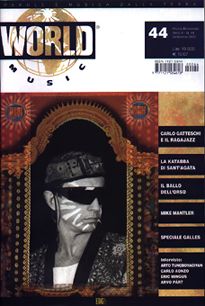 |
An
interview to Carlo Gatteschi, by Pietro Carfì ( excerpt
)
In thirteen years of self-produced, self-financed and self-organized
activity, Carlo Gatteschi and his Gezz Zero Grup has been compared to
the Ornette Coleman s "Prime Time", to the Bill Laswell "Material",
to the electric Miles Davis, to Frank Zappa, to Steve Lacy and to other
twentieth-century American and European experimental music masters.
But
for how many comparisons, paradigms are possible to do, the Gezz Zero
Grup s sonor way remains ineffable, always in movement, in transformation,
in regeneration...
the
Indoeuropean Music Ensemble's debut CD (Gandharva) finds here a project
turning, in the intentions and in the concrete expression.
Ikram
Khan (sarangi), Deobrat Mishra (sitar), Hanif Khan (tabla), Alberto
Capelli (guitar), Carlo Gatteschi ( saxophones ) helped episodically
by other musicians, have moved from what it was possible to unite them,
rather than divide them: the common Indo-European root, the alternate
of composition and improvisation, the balance between reflection and
emotion.
The
ragas has been arranged by the italians, the pieces of the italians
has been arranged by the indians: everybody has spoken the language
of his own instrument and he has been a different cultures and different
tensions bearer.
Rather
than a "cold fusion", Gandharva is an alchemy, it seems a
reasoned and spontaneous meeting, nearly natural.
An
original world music episode...
|
|
What need there was of the Indoeuropean Music Ensemble?
There
was not any "need" of the Indoeuropean: the plans of many
musicians doesn't born cause of "need", but cause of enjoy,
cause of the pleasure of playing it, cause of making something of which
the musician is proud, happy for himself, coherent with his own aesthetics,
also to listen from the voice of his own group that music that it still
doesn't exist, but that he wish to listen to.
They
are the dealers that "have the need" of selling a determinate
product, because they foresee the intentions of the possible buyers
I
have played with Italian rock, jazz, popular, dance, and symphonic musicians,
as it usually happens, sometimes for chance: someone calles you, some
friends
I
have played with Europeans, with South American musicians in Italy and
in South America, with African musicians, with American musicians as
James White ( now James Chanche ) and the Contorsions, the cellist Tristan
Honsinger, the poet John Giorno.
I
have studied cultural anthropology and music to the university and I
was interested to the hindi art and philosophy.
I
desired since a long time to deepen my superficial Indian world knowledge:
I
desired to live from the inside the hindi culture. It has been a dream,
to think about the possibility of talking on philosophy, art, and music
with brahmen, with big musician, it was more than a desire, as for a
thief it is to enter inside of Fort Knox, a hazard, a big honour that
you know that Life has assigned only to few people and that then it
really has happened to me.
If
for many cases the random circumstance has been very important to determinate
my experiences, about the I.M.E. story I can say that I have looked
for the Indian musicians, on this plan I have built castles in the air,
I have thought, planed for a long time before meeting the musicians
and playing with them.
I
have looked for Indian musicians who wanted to play with me in a common
project that assumed the existence of a common culture, a Indo-European
affinity, a plan that needs to have much patience and trust on ourselves,
a plan where everybody have to compose and to arrange the music together
with the other musicians.
The
group played his first concert with contrabass, tabla, sitar and sax,
then a sarangi player arrived, and other italian musicians, from the
guitar player, to the whole Gezz Zero Grup electric quartet, with drums
and electric bass.
The
contents of the project, the most important thing in music, are in the
Indian and European culture s roots.
Every
raga ( the "track" of the hindi classical music) is correlated
to specific argument, such as the nine feelings ( love, joy, disgust,
rage, wonder, sadness, peace, devotion, melancholy ) or nature s events
( night, rain, sunset ).
In
Europe, in the last century, the arts joined to the abstract, to the
progressive detachment from a reality always more source of fear and
uncertainty, rather than of inspiration.
The
twentieth century disastrous conflicts have borne people and artists
to hide the feelings, but as soon as before this catastrophes Beethoven
has written the "Moonlight" Sonata, the "Heroic"
one, the "Passion", and many other composers till Mahler and
Schoenberg describes the human feelings or the natural events like it
happens in the indian music.
Going
there, living there, and meeting people, I thought that our European
cultural roots came from a big area from the Mediterranean Sea to the
Indian Ocean, and I thought also that our present cultural colony status,
first German then American, it has not to affect us so deeply as it
seems.
So,
I really believe that exist deep connections between Indian and European
cultures, and this I.M.E. project is really charming for me because
it is not only a formal approach of a sax with a sitar.
In
this group I can discuss about very important things with representatives
of a culture that has deeply studied the man in such a different way
than we europeans have done.
About
our way of playing, being we Italian usually jazz musicians or improvisers
however, there is a perfect syntony with such big improvisers as they
are.
They
don't read music and I have never liked scores on stage, we have to
think, to plan, to speak, to play and to listen to or to listen and
to play.
We
are in full agreement!...."
N°
44 MUSIC WORLD, September 2000
|

